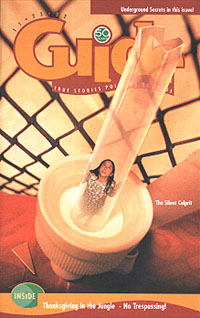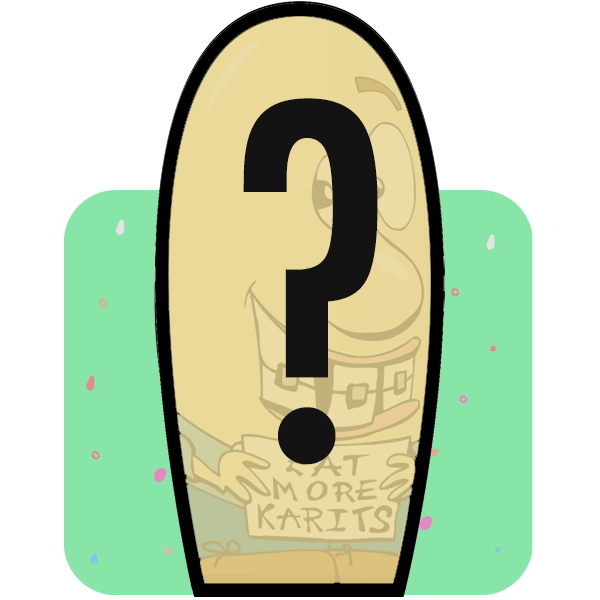Who broke the eyedropper?” Mr. Gillham asked. He held the incriminating evidence in front of our sixth-grade class. His voice was serious, his eyebrows raised inquiringly.
Nobody answered. The silence was so powerful that it almost became a noise. Todd and Jason, the two class clowns, shifted uncomfortably in their seats. It seemed as if everyone was waiting for one of them to confess.
Everyone except me. I sat in the back row next to Todd. I was the quiet girl. The A student. The one teachers loved to place next to troublemakers. In short, I was the least likely suspect. Nobody even noticed as I nibbled uncomfortably on my bottom lip.
I had broken the eyedropper during science class. We were working on an experiment involving acids and bases. My group had sent me to get the equipment. I grabbed the ill-fated instrument and accidentally dropped it. No one seemed to have noticed. Without a second thought, I put it back in the box and grabbed another. I didn’t even consider telling Mr. Gillham. After all, it was just an eyedropper.
Now I tapped my feet on the gray tile floor and wondered what to do. Never in a million years will someone think it’s you, a voice seemed to whisper in my ear. And it’s not as though you did it on purpose. I gazed at my folded hands and said nothing.
“It’s not just an eyedropper,” Mr. Gillham said, looking slowly around the room. “This is a matter of honesty.”
Oh no, I thought. I certainly can’t confess now. Everyone will think I’m a liar.
“I’m sorry to say this,” Mr. Gillham continued, “but we will stop working on the science experiment until someone confesses.” He put down the eyedropper and picked up our English textbook. The class moaned.
At recess my friends huddled in a group. “Those boys are such jerks,” Joanna said. “They should just confess. We all know who did it.” She cast a dark eye at Jason and Todd as they stood on the baseball field playing catch. Without answering, I bent down and hastily retied my shoelaces.
The question of what to do loomed over me like one of those cartoon thunderstorms. I struggled throughout the rest of the day. I did poorly on a social studies quiz. I couldn’t concentrate in math.
By now I desperately wanted to say something. I had given a hundred imaginary confessions in my head. But each time I decided to approach Mr. Gillham, I was filled with doubt. What would he think of me? What would the class think? As long as I kept quiet, everyone would continue believing that I was a good person.
When I got home that afternoon, my older sister Sonja took one look at me and asked, “What’s the matter? Something happen at school today?”
“It’s nothing,” I replied, flopping down on the couch.
“Try me,” Sonja said.
I took a deep breath and told her the whole story. “So anyway,” I finished with a melodramatic sigh, “I just don’t know what to do.”
“Come on,” Sonja said. At 15, she liked being the expert. “You totally know what to do. The question is–how long are you going to torture yourself?”
I stared down at my chewed fingernails and said nothing.
“How about this?” Sonja said. “I’ll find Mr. Gillham’s phone number, and you can call him now.”
“Call his house?” my voice squeaked. My eyebrows shot up in alarm. But Sonja didn’t seem to notice. She was too busy flipping through the phone book.
“Here it is,” she said triumphantly. She circled his number and handed me the book. When she finally noticed my look of panic, her face melted. “OK, let’s practice. Pretend I’m Mr. Gillham.”
We rehearsed several times. Then, with a shaking hand, I dialed the number. Mr. Gillham answered the phone with a cheery hello.
“Hi, Mr. Gillham,” I said. “This is, um, this is Sari.”
“Hi, Sari.” His voice was pleasant. “What can I do for you?”
“Well,” I stammered. Now that the moment of truth had arrived, it was worse than I had imagined. My palms were sweaty. My voice trembled. My heart felt as if it were going to leap out of my body. I began to realize what a big deal an eyedropper could be.
“I just called to tell you that I broke the eyedropper.” Now that I had begun, the words tumbled faster and faster. “I’m really sorry. I didn’t mean to. It was an accident. I should have told you, but I didn’t think it mattered, and then I was too embarrassed. I’m so sorry. I’ll pay for it. I’m sorry.” I forced myself to stop talking.
“Thanks for telling me, Sari,” Mr. Gillham said kindly. “I really appreciate it. I’m sure it was an accident. So let’s not worry about this anymore.”
When I got off the phone, I was grinning.
“See. I told you,” Sonja said. This time I didn’t even care if she was right.
Mr. Gillham could have told me that my silence was a lie. He could have told me that by not speaking out, I was giving other people a bad name. He could have reminded me that even small things are a big deal if we have to hide our actions. But I guess he knew he didn’t have to. I had already learned the hard way.
Illustrated by Terrill Thomas


